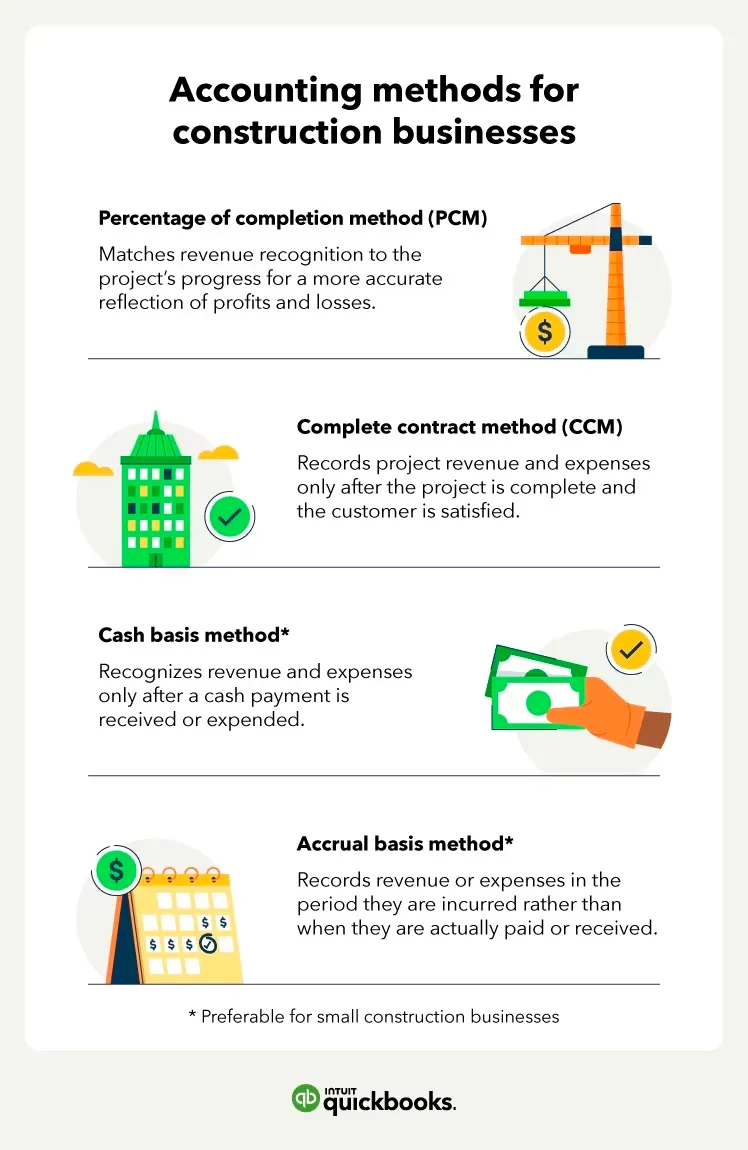Recognizing the Relevance of Construction Audit for Effective Task Monitoring

Duty of Building And Construction Audit
Construction bookkeeping works as the foundation of financial administration in the building industry, ensuring that jobs are completed within spending plan and financial purposes are met. construction accounting. This customized accounting method addresses the distinct challenges encountered in building jobs, including differing task periods, changing expenses, and numerous stakeholders
One of the main roles of construction bookkeeping is to offer accurate expense estimate and tracking throughout the task lifecycle. This helps with educated decision-making, making it possible for task supervisors to change sources and timelines successfully. Furthermore, construction accountancy improves cash money flow administration by keeping an eye on accounts receivable and payable, therefore guaranteeing that funds are readily available for prompt settlements to vendors and subcontractors.
It furnishes project managers with the essential financial data to prepare in-depth monetary declarations, which are important for audits and financial evaluations. Ultimately, the duty of building accounting extends beyond simple economic tracking; it is integral to critical planning and operational effectiveness, driving the success of building tasks in a competitive landscape.
Trick Elements of Building Bookkeeping

Budgeting establishes an economic structure that guides job implementation, permitting managers to assign resources successfully and prepare for prospective monetary difficulties. Exact cost monitoring is important for tracking expenses in real-time, assisting to identify variations between projected and actual prices. This allows timely modifications to keep the task on budget.
Additionally, financial reporting offers stakeholders with a clear image of the project's economic wellness. Regular records, such as earnings and loss declarations and cash money flow evaluations, help with educated decision-making and improve openness amongst all celebrations entailed.
Furthermore, conformity with industry guidelines and audit standards is critical. This makes sure that financial methods are not only reliable however also lawful, guarding the company against legal effects. By incorporating these crucial components, building and construction bookkeeping cultivates an organized strategy to taking care of monetary resources, eventually adding to the successful conclusion of building and construction tasks.
Advantages for Project Supervisors
Leveraging effective building accountancy practices gives task managers with a wide range of advantages that enhance both functional effectiveness and financial oversight. One substantial benefit is enhanced budget administration. Precise tracking of revenues and expenditures permits task supervisors to keep an eye on monetary efficiency in real time, making sure jobs continue to be within budget plan and facilitating prompt adjustments when essential.
Furthermore, building bookkeeping simplifies capital management, allowing task supervisors to prepare for financial demands and enhance resource allotment. By recognizing cash inflows and discharges, they can better take care of repayments to subcontractors, workers, and providers, consequently avoiding expensive hold-ups.
In addition, robust bookkeeping systems give extensive coverage abilities. Project managers can produce reports that use insights into task success, expense differences, and resource usage. This data-driven approach fosters educated decision-making, permitting supervisors to recognize potential problems proactively and carry out rehabilitative procedures.
Last but not least, adherence to construction accounting standards guarantees conformity with lawful and regulative needs, decreasing the danger of charges or disputes. Generally, effective building and construction bookkeeping outfits project supervisors with the devices required to drive task success, boost stakeholder self-confidence, and advertise long-term organizational growth.
Typical Difficulties in Construction Bookkeeping
Many task supervisors come across substantial difficulties in building accountancy that can prevent job success. One of the main challenges is the complexity of tracking several work sites, each with distinct budgets, timelines, and resource allocations. This requires careful focus to information, which can be frustrating without a durable audit system in location.
In addition, varying material expenses and labor prices can complicate spending plan management, making precise forecasting challenging. Task managers often struggle to fix up these costs with actual expenses, bring about possible monetary discrepancies.
Furthermore, construction accountancy entails conformity with various guidelines, consisting of tax obligation responsibilities and labor legislations. Browsing these policies can be overwhelming, particularly for supervisors who might not have a strong audit history.
Another significant challenge is handling cash money flow, which is critical in the construction market. Delays in invoicing, settlements from customers, or unforeseen job adjustments can produce cash money circulation scarcities, jeopardizing the task's progress.
Finally, effective interaction in between task managers, accountants, and area teams is crucial. Misconceptions can result in unreliable monetary reporting, additionally complicating task management efforts. Resolving Read Full Article these difficulties proactively is essential for successful building accountancy.

Ideal Practices for Effective Accountancy
While navigating the complexities of building and construction accounting can be complicated, taking on finest practices can dramatically boost monetary administration and job success. One basic practice is preserving timely and accurate records. Applying durable bookkeeping software application tailored to building and construction projects can enhance data access, invoicing, and reporting, decreasing mistakes and saving time.
Additionally, establishing a clear budget plan and regular surveillance versus this spending plan are important. Employing a system of routine economic testimonials permits task supervisors to determine variations early, helping with prompt decision-making. It is additionally necessary to different job expenses into straight and indirect groups, enabling more clear insights into profitability.
One more finest technique includes fostering open interaction among all stakeholders. Regular updates and collective discussions why not try this out regarding monetary condition can guarantee everybody is lined up and educated. Training personnel in construction-specific audit concepts additionally enhances proficiency and precision.
Lastly, ensuring conformity with relevant accounting standards and regulations is non-negotiable. Normal audits and interior evaluations add to transparency and responsibility, developing depend on with stakeholders and customers. By focusing on these best practices, building and construction companies can enhance their best site bookkeeping processes, ultimately driving task success and monetary stability.
Conclusion
In final thought, construction bookkeeping plays a crucial role in guaranteeing effective task management by assisting in exact financial oversight and enhancing decision-making. By incorporating vital components such as cost estimate, capital management, and compliance, task managers can navigate typical challenges and leverage finest techniques for reliable audit. Eventually, a robust building bookkeeping framework not only safeguards spending plan integrity however likewise contributes to the total economic health and wellness of building tasks, cultivating sustainable success within the market.
By integrating these crucial components, construction bookkeeping cultivates an organized strategy to managing financial sources, inevitably adding to the effective completion of building jobs.
Accurate tracking of expenses and earnings permits task supervisors to check monetary efficiency in genuine time, making sure jobs remain within spending plan and helping with timely adjustments when essential.
Job managers can produce reports that offer understandings into task success, cost differences, and resource application.Many project supervisors experience significant difficulties in building and construction audit that can impede task success. construction accounting. Eventually, a durable building and construction accounting structure not just safeguards budget stability however likewise contributes to the total monetary health of building and construction jobs, promoting sustainable success within the market
Comments on “Construction Accounting: Simplifying Complex Financials in the Construction Industry”